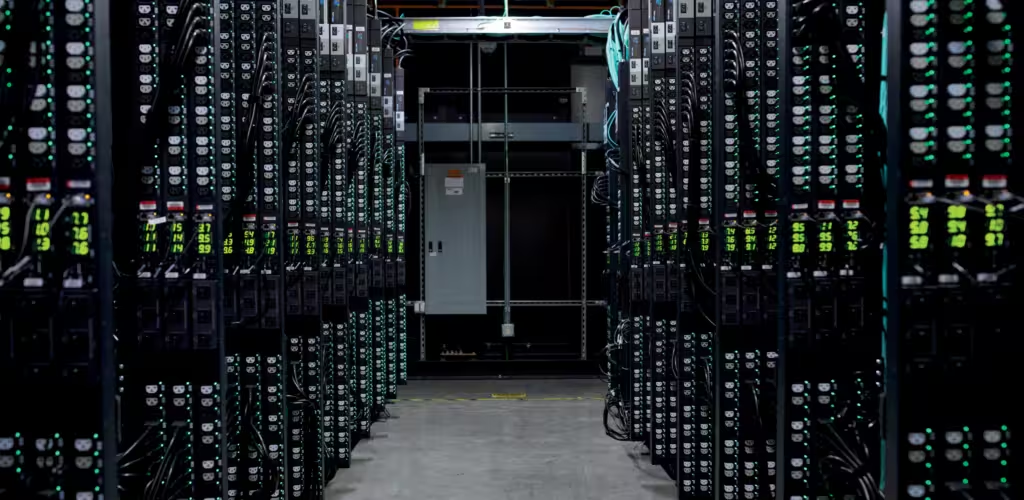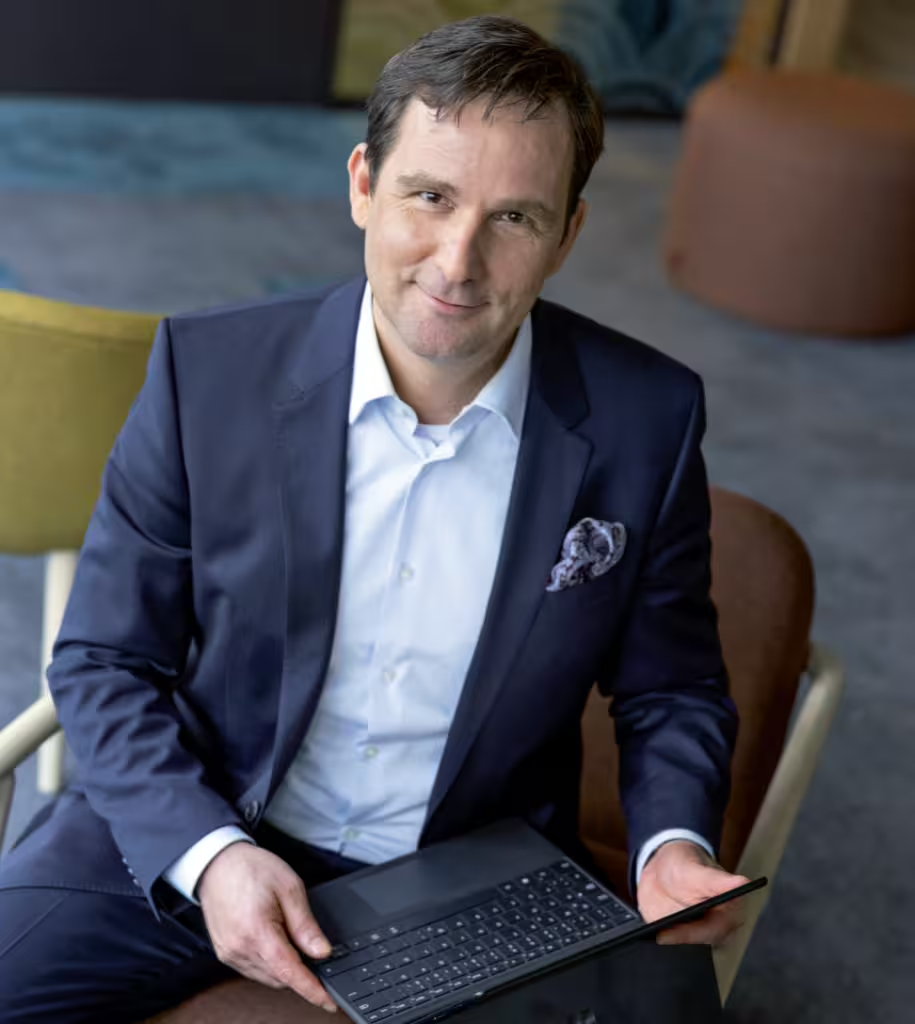
Microsoft is one of the most powerful and valuable companies in the world and has also undergone a transformation in Austria.
Almost everyone uses (primarily) Microsoft's Office products, but the company has undergone a transformation in recent years. This affected both the product portfolio and the departure from top-down management. Hermann Erlach, General Manager of Microsoft Austria, played an important role in this in his home country and internationally.
How many Apple devices are in the Microsoft headquarters in Vienna?
Hermann Erlach: There are relatively few devices, but we have a lot of iPhones, around 70 to 80 percent. I haven't seen a laptop or any other device yet, our employees rely on Surface. But we are relatively open when it comes to phones. We have had a great partnership with Apple for several years now and have opened up our office tools to Apple's operating systems. There is a nice kind of competition. Apple is very much in the consumer sector and we are increasingly in the enterprise sector.
and corporate environments. They actually complement each other quite well. Microsoft left the phone business years ago, but we see our other devices as being on a par. In recent years, Microsoft has developed very strongly towards an open platform.
How do you see Austria’s position in the digital world?
Erlach: We are increasingly inclined to move into a world that consists of zeros and ones and in which there is nothing in between. These discussions are not getting us very far. The same applies to the status of digitalization in Austria and you have to look at it very differentiated. At Microsoft, we want to act as a partner for the sustainable and secure digital transformation of Austria and, especially in 2023, we have delivered a lot of lighthouse projects from Austria that show how much Austrian companies are moving forward and driving innovation. A good example would be the Hannover Messe, where the cooperation with Andritz in the field of artificial intelligence (AI) and machine control has had a very positive impact. We have a partnership with AVL, where we are driving modern vehicle development based on AI and cloud models. There are some very nice projects in the medium-sized sector and also some in the public sector that are moving forward and are lagging behind other European countries in terms of technological development and, above all, adaptability. The speed with which we have adapted technologies such as the cloud in recent years is much slower than in other cultures. On the one hand, it is a cultural issue that Austrians are rather skeptical about innovation. It is actually a skilling issue and the question of how to quickly bring the right skills to the masses. And that CEOs can do something with cloud technology and know what modern IT architectures look like. The funding system also plays a role in adaptation and more intensive consideration must be given to what kind of innovation and willingness to take risks is promoted. There is also the issue of regulations and their complexity, which does not necessarily make it easier to adapt new technologies very quickly. Nevertheless, we notice that the demand for a robust digital infrastructure in Austria is increasing rapidly.

Regulations are often criticized, especially at EU level, for being too strict…
Erlach: We support all types of regulations. We don't see this in a negative context, but we are in favor of sensible regulations that don't hinder innovation. We work closely with all authorities and the EU, but there is always a tension between the speed of innovation, regulations and security. Here you have to find the right middle ground.
What about Microsoft’s investments in Austria?
Erlach: We have one of the strongest local footprints in Austria and, as Microsoft, we invest a lot. We have announced our data centers around Vienna. These will be the most modern data centers in the world, especially in terms of energy efficiency and CO2 footprint. They have up to 93 percent less energy requirements and cause up to 98 percent fewer CO2 emissions than traditional data centers. We invest in our partner ecosystem of up to 4,500 partners who live with and from Microsoft, and we have AI developers on site. We also run topics such as the AI impact study and try to have a positive impact on the country with our ecosystem and the 'Make tomorrow possible today' initiative. I believe that the topic of digitization and AI is underrepresented in Austria, including in the political agenda. That is why we are strongly promoting digitization and AI to be given a more positive spin and included more in the political agenda than before.
What tasks does Austria still have ahead of it in terms of AI?
Erlach: A study has shown how fundamental the topics of digitization and AI are for Austria. In the public perception, this is still fraught with fear; in this respect, we need to educate politicians and business people much more about what AI is and what it is not. What can you do with AI, what can you achieve? Our biggest issue will be how we can maintain and redistribute wealth and remain competitive given the resources available on the market. How can we set up and position companies so that they are internationally competitive? Here, too, AI is an enormous lever.
With OpenAI and ChatGPT, Microsoft sparked the hype around generative AI two years ago. Is the excitement about it more hysteria or will digital humanism prevail?
Erlach: I like the title Digital Humanism because we support the fact that people should be the focus and not technology. That's why we called our system Co-Pilot and not Autopilot. People are the focus and the system assists. I'm a little sad about the development of the AI topic because AI as it is discussed does not exist. It is a toolbox and in it there are a wide variety of tools with different application scenarios and also different risk situations. I think that a generic discussion about whether AI is good or bad will not get us anywhere. We need a technology openness that also takes the issue of regulation seriously and looks at the specific application case, such as in the supply chain or logistics. And only then do I have the discussion about what the added value and impact are and how I can secure them. The media plays a big role here in telling these positive stories about AI. If someone thinks it's a hype, then they haven't understood the topic. We are facing a completely new situation. Computers and the Internet grew over decades from universities to the military, and it took another ten years for the lines to be built. Only then did the technology reach consumers. Today, things are fundamentally different. The technology was launched worldwide in one go via ChatGPT. The availability of data, the computing power in the cloud and the availability of generic AI models mean that it is possible to carry out the most complex computing operations and the most complex AI projects from my living room. It doesn't matter whether I am a large company, a start-up, a researcher or an individual company. This has never been the case before. The democratization of IT has never happened in this form. Today, I can suddenly compress research processes that used to take decades into a few months using data, AI and computing power. This is where things come together that we have been talking about for decades. Big data is suddenly relatively easy to achieve. And the models, not just those from Microsoft, are publicly accessible. In Austria, we have the opportunity to generate GDP growth of up to 18 percent through the use of AI, according to a joint study by Microsoft and Accenture on behalf of Economica.
Since May, Copilot+ PC has been available as hardware that is tailored to AI. Was that the logical step?
Erlach: Basically, Microsoft's philosophy is that we want to integrate software and hardware and make it accessible to everyone. After the devices were introduced, everyone looked at the co-pilot key on the keyboard, as that was the first change to the keyboard in decades. It's about energy-efficient PCs and the integration of AI functionality. And about gearing the hardware as much as possible towards the AI world and thus running more local large language models that have lower energy requirements. We are also researching and developing the hardware in this direction.
What is the situation with sustainability and energy saving in general at Microsoft?
Erlach: This is a top issue for us. We are building up our network of data centers worldwide and want to be CO2-neutral by 2030. Achieving this with data centers requires a huge effort. We are developing more powerful processors and data center technology, we are researching new cables and large language models that consume less energy and are also smaller. In this way, we are trying to reduce our energy footprint. It is clear that we need cloud and AI technology to transform Austria itself into a sustainable business location. We already have some very nice projects in this country in which we use AI to manage energy better. In the photovoltaics sector, for example, we are working with Wien Energie, and with Billa/Rewe on the supermarket of the future, which consumes less energy. There are endless application scenarios with AI, especially in energy optimization. CO2 avoidance and sustainability are high on our agenda, including for devices.
How has the Microsoft Skills Campus developed and what is its current status?
Erlach: Very good. Skilling is an easily communicated topic, and it is necessary to provide people with information on the topics of digitization and the cloud. A lot has happened since the Cloud Campus was founded. We have qualified 120,000 Austrians in the Skills Campus so far, have a lot of collaborations from the 'Make tomorrow possible today' program, our digitization initiative in which more than 250 organizations are involved, and we are working more closely with the 'Digitalization Initiative Austria', with technical colleges and universities. The education area is a matter close to Microsoft's heart. It teaches you how to use digital systems, what a cloud is, we discuss security topics, dos and don'ts when dealing with digital content. Now, of course, we also learned what AI is and tried to explain what it can do, where the opportunities and potential dangers lie.
What do you find exciting about working for Microsoft?
Erlach: When I was asked to work for Microsoft and take on a leadership role, my first reaction was 'no', because for me the products were industry agnostic and very technical. The corporate culture back then, nine years ago, was different, very hierarchical and top-down. I didn't want to work for a company like that. We then discussed how Microsoft should change, what the transformation to the cloud, towards industry scenarios and platform opening might look like. The challenge of working in a company that is reinventing itself, the restructuring of Microsoft and the announcement at the time that the cloud on a large scale would only be used by three technology companies in the future, totally fascinated me.
A life without Microsoft products would be…
Erlach: …possible, but less efficient.